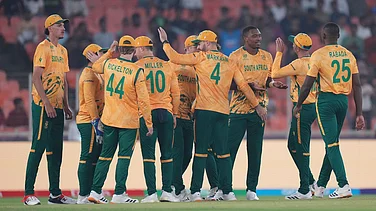ON an overcast morning last week, Nabin Mondal, 23, teed-off on the lush greens of the Royal Calcutta Golf Club (RCGC). The son of a grocer, and a high school dropout from the next-door Madartala slum, he grew up a caddy, earning Rs 40 for a round of golf. But he entered this four-day-long Rs 5-lakh prize money golf tournament, as a participant (with borrowed equipment). "Living next to a golf course and seeing members play," he says, "inspired me to take a shot at a golfing career."
Sadly, not all in the neighbourhood share Mondal and his ilk's—the club's 200-odd caddies hail from slums bordering its boundary wall—sentiments about the world's second oldest golf club outside the British Isles. They don't feel that the 88-year-old 167-acre club with a 18-hole course and a hand-picked 1,500-strong membership has been a social leveller of sorts: caddies from its hardscrabble surroundings like this year's Indian Open winner Firoz Ali or Jamsher Ali and Basad Ali are ace golfers today.
So last fortnight, the simmering tension between locals, mostly from brick and tiled-roof refugee townships, and the golf club came to a head when a 19-year-old was shot dead by the police in the club grounds. Reason: the cops tried to stop locals from plucking mangoes, and in the ensuing altercation, say the police, a rifle went off. Some 300 enraged locals invaded the club, ransacked a golf shop and torched a pavilion. "Such a shameful incident," says a club official, "has never happened before."
In many ways, such a tragic climax had gradually been building up. In the tumultuous '60s, the neighbourhood was a hotbed of Naxalite activities with frequent shootouts outside the club boundary. That's when residents of the refugee townships wrapping the club bored huge holes into its 10-ft-high boundary wall. The club's greens became the locals' lawn—they enjoyed siestas, watched games, plucked fruits, and played football. Soon, antisocial elements cashed in on these breaches—peddling hooch, gambling, running prostitution rackets, and intimidating officials after dusk.
Six years ago, rival gangwars on the club's premises dumped two corpses on the course. When a police picket was put up to check trespassing, locals like fish-seller Biswajit Sen felt the club was trying to deny them "the small and harmless pleasures of using the club grounds for plucking fruits and playing games". Says local CPI(M) councillor Sanjay Banerjee: "The club and the locals have to coexist peacefully. The club has to appreciate the locals' needs."
But the club has its own compulsions.With big money flowing into golf, and tournaments proliferating, it needs to upgrade security and woo sponsors to host more tournaments. With business pulling out of the Eastern region, within five years the number of regular tournaments in the two premier golf clubs, RCGC and neighbouring Tollygunge Club, have dropped to two from four. Of the total Professional Golf Association (PGA) Indian tour prize money of Rs 1.8 crore, the two tournaments from the Eastern zone contribute a paltry Rs 11.5 lakh. "Deteriorating law and order around a golf club adversely affects sponsorships, tournaments, and business confidence in a state," says Brandon C. de Souza, chief executive (tour operations), Tiger Sports Marketing, a premier golf event management outfit. Clearly, there are limits to which an oasis of the rich can be protected amidst a wasteland of impoverished ghettos and refugee colonies. When club authorities contacted the police five months ago to plug the breaches, local residents enlisted the support of politicians against the move. With 25,000 voters in the area, the police refused to get involved. So the administration could be rooting for 'peaceful coexistence', after all.
Last week, while the Cynamid Open was on in full swing, locals carried on their daily routine—scaling boundary walls, enjoying siestas and watching players—quietly. Surely, this turn of events won't gladden Marxist chief minister, Jyoti Basu, who usually spends his new year's eve at the RCGC—and is desperately wooing business for his beleaguered state.


























